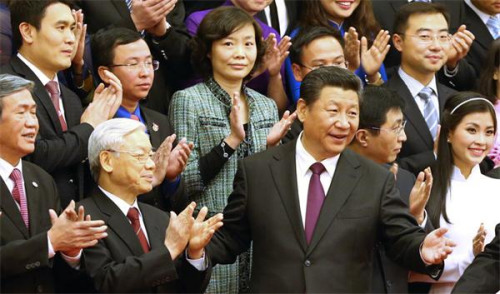
Xi Jinping, general secretary of the Communist Party of China Central Committee, and Vietnam's Communist Party chief Nguyen Phu Trong address young people from both countries in Beijing on Tuesday. (China Daily/Wu Zhiyi)
China and Vietnam observe the 65th anniversary of the establishment of diplomatic relations this year. While the occasion provides a special opportunity for deepening bilateral relations, the two countries have to make greater efforts to control their disputes in the South China Sea, such as the 2014 drilling rig incident.
From mid-2013 to the first four months of 2014, China and Vietnam maintained stability in the South China Sea. The year 2014 started with promising management of the situation, with the initiation in January of a departmental-level mechanism for bilateral consultation on joint development at sea. This has opened a new channel for the two countries to deal with more sensitive issues, and jointly explore and exploit non-living resources in the area claimed by the two countries.
However, tensions at sea escalated when the two sides strengthened their presence in the operation area by sending more vessels - law-enforcement as well as fishing vessels - to thwart each other's actions.
In mid-May, riotous protests against foreign-invested enterprises in south and central Vietnam not only caused damage to the assets of such enterprises, but also left casualties among their employees, including Chinese nationals. Chinese, Malaysian, Japanese, Singaporean and South Korean companies suffered huge losses in the riots. Given the severity of the situation, China, in coordination with Vietnam, sent ships to repatriate the Chinese nationals affected by the riots.
Since the riots took place at a time when Vietnam was making efforts to restore its reputation among foreign investors to attract more foreign direct investment, which is important for Vietnam's economic development, they hurt both sides. Tensions over the drilling simmered until China announced completion of the HYSY 981 operation in mid-July followed by the withdrawal of the rig.
Since then China and Vietnam have initiated a process aimed at rebuilding mutual trust, normalizing their overall relationship, and addressing the territorial differences. This active diplomacy is aimed at re-establishing cooperative relationship between the two sides and conforms to the efforts of the two countries' leaders to build a cooperative and mutually beneficial relationship.
But the resultant stabilization of bilateral ties does not imply that China and Vietnam have refrained from complaining about matters relating to the South China Sea.
The South China Sea issue is very sensitive for China and Vietnam both. And the May-July drilling incident has sent a strong signal to both countries that just one incident at sea, if not well managed, can throw bilateral ties off balance and create tension. More importantly, the two sides have realized that damage to mutual trust takes a long time to repair.
The drilling incident may not have long-term repercussions on bilateral ties, but it has created the need for both countries to reconsider their positions and policies as well as to further develop the bilateral management approach. And this approach has to be further developed to address all the disputes between the two countries.
If this is not done, drilling-like incidents are likely to recur in areas that are not included on the bilateral agenda and hence not covered by the approach.
This year could be decisive in terms of how the two countries will address their disputes in the South China Sea. The challenge is to properly manage these differences. Perhaps the bilateral dispute management approach has to be developed to the highest level and all outstanding issues have to be addressed. If carried out successfully, this will elevate the traditional friendship and deepen comprehensive strategic cooperation between China and Vietnam.
The article is co-written by Ramses Amer and Li Jianwei. Ramses Amer is an associate professor at the Institute for Security & Development Policy, Sweden, and Li Jianwei is director and research fellow of the National Institute for South China Sea Studies, China.
Courtesy: China& US Focus
















































